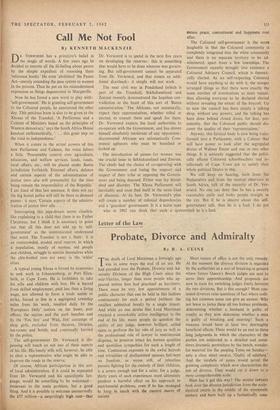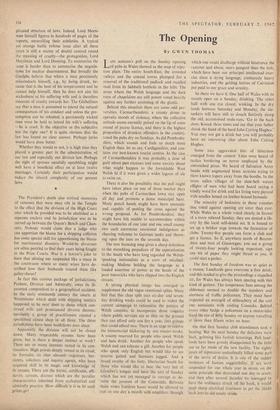Letter of the Law
Probate Divorce and Admiralty
By IL A. CLINE
THE death of Lord Merriman a fortnight ago was in some ways the end of an era. He had presided over the Probate, Divorce and Ad- miralty Division of the High Court since the mid-Thirties. longer than most people who ap- peared before him had practised as barristers. There must be very few appointments of a public character that can be held in this fashion continuously for such a period (without the smallest sabbatical break) by a single tenant. And while no one denies that Lord Merriman retained a remarkably active intelligence to the end of his life, many people do question the ability of any judge, however brilliant, called upon to perform the lay role of jury as well as the professional role of lawyer in matrimonial disputes, to preserve intact his human qualities and quotidian sympathies for such a length of time. Continuous exposure to the awful hatreds and trivialities of disillusioned spouses hell-bent on freedom, or worse still, of relentless parents fighting for the custody of their children, is a severe enough test for a saint; for a judge, thirty years of such experiences must ultimately produce a harmful effect on his approach to matrimonial problems, even if he has managed to keep in touch with the current mores of society. Short tenure of office is not the only remedy. At the moment the divorce division is regarded by the authorities as a sort of breaking-in ground where future Queen's Bench judges are sent to serve their apprenticeship. And proposals are now in train for switching judges freely between the two divisions. But is this enough? Most con- tested divorces raise questions of fact where noth- ing but common sense can give an answer. Why not leave to juries these all too human probleths, determining whether a husband is guilty of cruelty as they now determine whether a man is guilty of breaking and entering? Such a measure would have at least two thoroughly beneficial effects. There would be an end to these long judgments in which the characters of the parties are subjected to a detailed and some- times dramatic portraiture by the bench, wonder- ful material for the peeping Toms on Sunday— only a clear short verdict, 'Guilty of adultery.' And the verdicts of juries would arrest the growing complexity which now characterises the law of divorce. They would cut it down to a more comprehensible scale.
How has it got this way? The secular lawyers took over the divorce jurisdiction from the eccle- siastical courts in the middle of the nineteenth century and have built up a fantastically com-
plicated structure of laws. Indeed, Lord Merri- man himself figures in hundreds of pages of the reports, unravelling their subtleties. A typical yet strange battle (whose issue after all these years is still a matter of doubt) centred round the meaning of cruelty—the protagonists, Lord Merriman and Lord Denning. To summarise the issue is harder than to summarise the negotia- tions for nuclear disarmament. But broadly the Guelphs believe that where a man persistently misconducts himself, e.g., by being drunk, be- cause that is the bent of his temperament and he cannot help himself, then he does not aim his wickedness at his suffering wife and is therefore innocent of cruelty towards her. The Ghibellines say that a man is presumed to intend the natural consequences of his conduct and unless the pre- sumption can be rebutted, a persistently wicked man must be held to intend his wife's suffering —he is cruel. Is the objective or the subjective test the right one? It is quite obvious that the law has found no clear answer. Perhaps juries would have done better.
Whether they would or not, it is high time they played a greater part in the administration of our law and especially our divorce law. Perhaps the sight of spouses squalidly squabbling might well have a beneficial effect on at least twelve marriages. Certainly their participation would reduce the absurd complexity of our present laws.
The President's death also revived memories of rumours that were once rife in the Temple to the effect that the division of the High Court o*er which he presided was to be abolished as a separate enclave and its jurisdiction was to be carved up between the Queen's Bench and Chan- cery. Nobody would claim that a judge who can apportion the blame for a shipping collision has some special skill for apportioning the blame for matrimonial disasters. Would-be divorcees are often puzzled to fihd their cases being fought in the Prize Courts. Was it a lawyer's joke to have that shining oar suspended like a mace in the courtroom where so many wives have de- scribed how their husbands treated them like galley-slaves?
In fact this curious package of jurisdictions, Probate, Divorce and Admiralty, owes its ill- assorted composition to a geographical accident. In the early nineteenth century the courts at Westminster which dealt with shipping matters happened to be next door to thdse which con- strued wills and pronounced divorce decrees; inevitably a group of practitioners created a specialised closed shop in all three. The thtee jurisdictions have been bedfellows ever since.
Apparently the division will not be closed down. Many respectable reasons have been given, but is there a deeper instinct at work? There are so many interests vested in its con- tinuation. High priests deeply versed in its ritual, its formulae, its rites abound—registrars, bar- risters, solicitors and inquiry agents, who have acquired skill in its magic and knowledge of its arcana. There are the forms, certificates, affi- davits, caveats, decrees which are the peculiar characteristics inherited from ecclesiastical and admiralty practice. How difficult it is to let such prizes go!



































 Previous page
Previous page